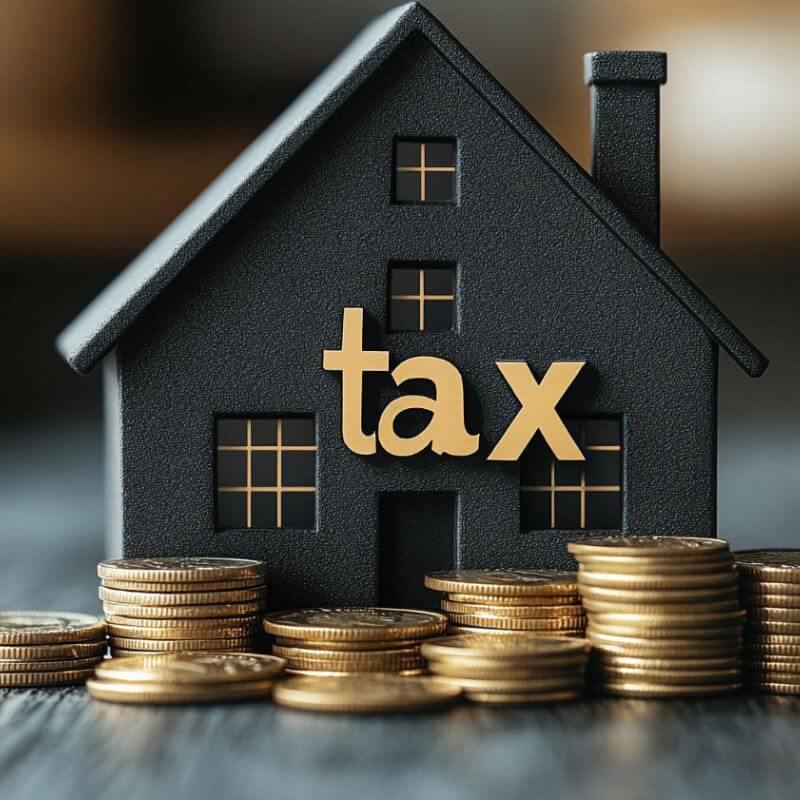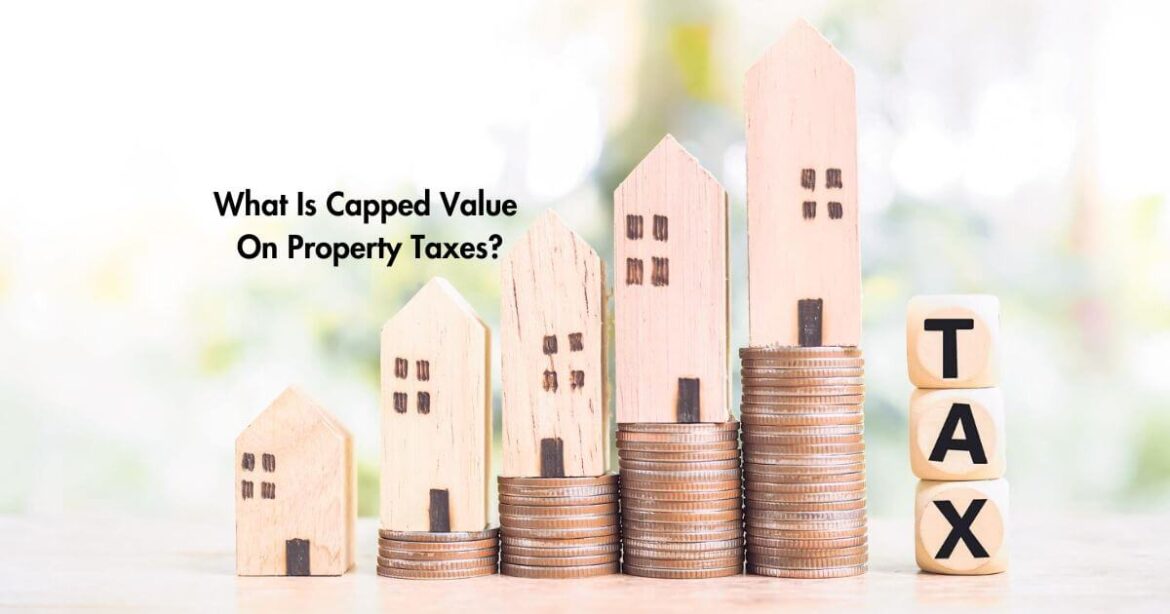When it comes to owning a home, many responsibilities come with the pride of homeownership. One of those responsibilities is paying property taxes which is a necessary contribution to local governments for services such as schools, roads, and emergency services.
However, for many homeowners, understanding the calculation and components of property taxes can be difficult. One concept that may seem confusing is the idea of “capped value in the property taxes”. In this article, I will tell you what capped value means, how it affects your property taxes, and discuss some key things you should know.
Read More: Does Section 8 Look At Tax Returns? What You Need To Know
Understanding Property Tax
Understanding property tax is crucial for all homeowners and property owners, as it directly affects their financial responsibilities towards local governments.
Property taxes are calculated based on the assessed value of the property, which includes both land and any fixed structures on it. This means that the more valuable a property is, the higher its assessed value will be, resulting in a higher property tax bill.
However, it’s important to note that fair market values can fluctuate over time due to changes in the real estate market or renovations made to the property. Therefore, it’s essential for homeowners to regularly review and understand their assessed value to ensure they are not overpaying in property taxes.
It’s also important for property owners to familiarize themselves with their local tax codes and have the right to contest their assessed value if they believe it is inaccurate.
What Is Capped Value And How It Protects Homeowners?
Capped value is a term used in property tax laws to limit the amount of increase in taxable value for a property. It means that there is a maximum limit on how much a property’s taxable value can increase from one year to the next, regardless of its actual market value.
This is done by taking into account the previous year’s taxable value and adjusting it for inflation, as measured by the Consumer Price Index (C.P.I). In some cases, there may also be adjustments made for any physical changes or improvements made to the property.
Essentially, capped value helps to control and stabilize property taxes, providing some relief to property owners who may otherwise face steep increases in their tax bills.
This is especially beneficial for long-term property owners who have seen significant appreciation in the market value of their property, as it prevents them from being taxed at a higher rate based on this increase alone.
With understanding the term of “Capped Value”, homeowners can have a better understanding of how much their property taxes may increase in the coming years. This allows for better budgeting and planning for those who are on a fixed income or have limited resources.
Read More: What Is A Per Capita Tax? | An Informative Guide
What Is Market value?
Market value is a crucial concept in the world of real estate. It refers to the estimated price that a property would sell for if it were put on the market and sold in a normal transaction between a willing buyer and seller.
In Michigan, this value is known as True Cash Value and is determined by the Assessor. This means that every year, the Assessor must assess all properties within their jurisdiction and determine their market values based on current economic conditions.
This includes not only residential properties but also commercial properties, factories, vacant land, and even personal property such as machinery and equipment for businesses.
The market value of these properties is constantly changing, and it is the Assessor’s responsibility to accurately determine this value at 50% of its true cash value.
Understanding market value is essential for buyers, sellers, and investors in making informed decisions about real estate transactions. It serves as an indicator of the current state of the real estate market and can greatly impact the buying and selling process.
What Is Capped Appraisal Value In Texas?
In the state of Texas, there is a limit on how much a property’s value can increase each year for tax purposes. This limitation was added to the state constitution in 1997 as a way to provide tax relief for homeowners.
According to this limitation, the appraised value of a property can either be the market value (what it would sell for on the open market) or 10% of the previous year’s appraised value plus any improvements made since the last appraisal. This calculated value is commonly known as “capped appraisal value”.
What Are The Criteria For Capped Appraisal Valuation?
When it comes to property taxes, homeowners often seek ways to reduce their tax burden. One option available is capped appraisal valuation, which limits the amount a property can be assessed for tax purposes. However, not all properties are eligible for this type of valuation. To qualify, certain criteria must be met.
Primary Residence Requirement
To be eligible for capped appraisal valuation, a residential property must serve as the primary residence of the homeowner. This means that the property must be occupied by the homeowner and claimed as their primary residence for tax purposes.
This requirement helps to ensure stability and predictability for homeowners when it comes to their property taxes.
Exemptions For Other Types Of Properties
While capped appraisal valuation is designed for residential properties, other types of properties may also qualify under certain circumstances. For example, agricultural or timberland may be eligible for capped appraisal valuation if it meets specific criteria and is actively used for agriculture or timber production.
Promoting Strong Communities Through Responsible Homeownership
Overall, the qualification for capped appraisal valuation serves a larger purpose. It promotes the idea of creating strong and stable communities through responsible homeownership. By providing stability and predictability in property taxes, homeowners are incentivized to invest in their communities and establish a long-term presence.
Furthermore, this qualification helps maintain a fair and accurate system of property valuation for all types of properties. This ensures that the benefits of capped appraisal valuation are reserved for those who truly need it, while also ensuring fairness for all property owners.
Therefore, it is important for homeowners to understand and meet these qualifications in order to benefit from capped appraisal valuation.
How Are Properties Appraised? Different Approaches To Property Appraisal

The process of appraising properties is a complex and detailed one that involves gathering various types of information from the community. This includes factors such as real estate sales, construction costs, rental incomes, operating expenses, interest rates, and any other relevant data.
Once this information has been collected by the Assessor, they can then proceed to determine the value of a property using three different approaches.
Sales Comparison Approach
The first approach is known as the Sales Comparison Approach and involves finding similar properties that have recently been sold in the area. However, it is not just enough to look at the selling price of these properties as there may be underlying reasons for the price difference.
For example, one property may have sold for a higher price due to an urgent need by the buyer, while another may have sold for a lower price due to the owner needing quick cash.
Cost Approach
The second approach is known as the Cost Approach and takes into account the current material and labor costs to determine how much it would cost to replace the property with a similar one.
This approach also considers depreciation factors such as wear and tear on older properties. The Assessor will also need to estimate the value of the land if it were vacant.
Income Approach
Lastly, there is the Income Approach which looks at a property’s potential for generating net income. This approach is mostly used for rental properties and takes into account the property’s ability to generate income in relation to its expenses.
By utilizing these three methods, the Assessor can accurately determine the value of a property and ensure fair assessments for all community members.
Capped Value Vs Assessed Value
Capped value and assessed value are both important factors in determining your property tax responsibilities. While they are often used interchangeably, it is crucial to understand that there is a distinct difference between the two.
Capped value places a limit on how much your tax can increase each year, providing some stability for homeowners. On the other hand, assessed value does not have any limitations and can fluctuate based on various factors such as market conditions or changes in the property itself.
Additionally, understanding the concept of taxable value, which combines both assessed and capped values, can help you accurately budget for your taxes. Knowing how the tax millage rate is applied to your capped value can also give you a better understanding of your potential tax obligations.
Overall, having a clear understanding of capped value vs assessed value can greatly assist in making informed decisions about home ownership and financial planning.
Learn More About Assessed Value: https://www.investopedia.com/terms/a/assessedvalue.asp
Why Is There Variation In The assessed Value Every Year?
The assessed value of a property changes from year to year because it must accurately reflect 50% of the market value. This means that as the market value of a property increases or decreases, so does its assessed value.
Factors such as improvements or damages to the property can also affect its assessed value. For example, if you make renovations or additions to your home, the assessed value will likely increase.
On the other hand, if your property experiences significant damage from a fire or natural disaster, the assessed value may decrease. Property owners are responsible for reporting any changes to their property that could impact its value.
If you obtain a building permit for construction or renovations, the local tax office will be notified by the Building Inspector’s Office. This is important because failing to report changes can result in an inaccurate assessed value and potential discrepancies between market value and assessment.
Read Also: How To Report ERC On Tax Return 1120s?
What Happens If You Don’t Pay Property Taxes?
If you fail to pay your property taxes on time, there can be serious consequences that could affect your finances and even your ownership of the property. One of the major consequences is a tax lien being placed on your property by the taxing authority.
This means that the government has legal claim over your property until the delinquent taxes are paid off. If these taxes remain unpaid, the government can foreclose your home and sell it at a tax sale to recoup the unpaid taxes. This could result in you losing ownership of your property and facing potential legal action from the government.
Additionally, failing to pay your property taxes on time could also negatively impact your credit score, making it difficult for you to sell or refinance your home in the future. You could also end up owing interest and penalties on top of the delinquent taxes, further adding to your financial burden.
In extreme cases, if the tax debt remains unpaid for an extended period of time, the government may take legal action against you such as wage garnishment or seizure of assets. Therefore, it is crucial to pay your property taxes on time to avoid these serious consequences and maintain your ownership of your property.
Remember, timely payment of property taxes not only helps you avoid penalties but also ensures the smooth running of local government services such as schools, police departments, and road maintenance.
What Are The Consequences If Someone Else Pays My Property Tax?
If someone else pays your property taxes, it can have both positive and negative implications for you as the property owner. On one hand, it may provide financial relief by easing the burden of a hefty tax bill. This unexpected bonus could free up funds for other important expenses.
Additionally, having someone else pay your property taxes can help you avoid delinquency and the associated penalties and interest. However, it also has some potential drawbacks that are important to consider.
For instance, the person paying your taxes may want a say in property matters, leading to conflicts or loss of control for you as the owner.
Furthermore, depending on local laws, they may be able to obtain a tax lien on your property, potentially leading to legal complications or long-term consequences for your ownership.
It is important to carefully evaluate the situation and consider seeking professional advice to fully understand the implications of someone else paying your property taxes.
How Do You Determine Your Tax Bill?
One key factor in determining your tax bill is the assessed valuation of your property. This value is determined by the Assessor and serves as the base for calculating your taxes.
However, it’s important to note that this value alone does not determine the final amount of tax you pay. The other crucial element is the local millage rate, which is set through voting by members of the community.
By electing leaders who have the authority to set these rates within certain limits, individuals can directly impact their own tax bills. As such, understanding and actively participating in local elections can play a significant role in determining your tax burden.
Additionally, it’s worth noting that a decrease in the millage rate can offset any increases in assessed valuation, providing some control and flexibility for taxpayers.
Read More: How To Pay No Taxes On Rental Income?
What Is Capped Value On Property Taxes? Conclusion
Hence, capped value is not a separate component of property taxes, but rather a limitation on the appraised value of a homestead. It serves to protect homeowners in areas with rapidly increasing property values and provides predictability for future tax bills.
Understanding this concept can help homeowners better manage their financial responsibilities and plan for the future. So, it is important for you as a homeowner to be aware of how capped value works in your state and to keep track of any changes in your property’s appraised value.
This way, you can stay on top of your property taxes and avoid any surprise increases in your tax bills.
